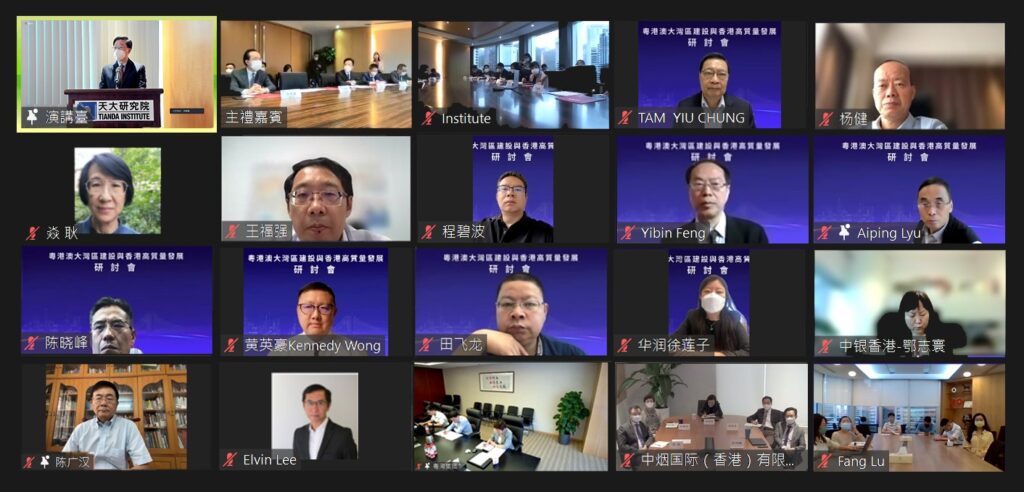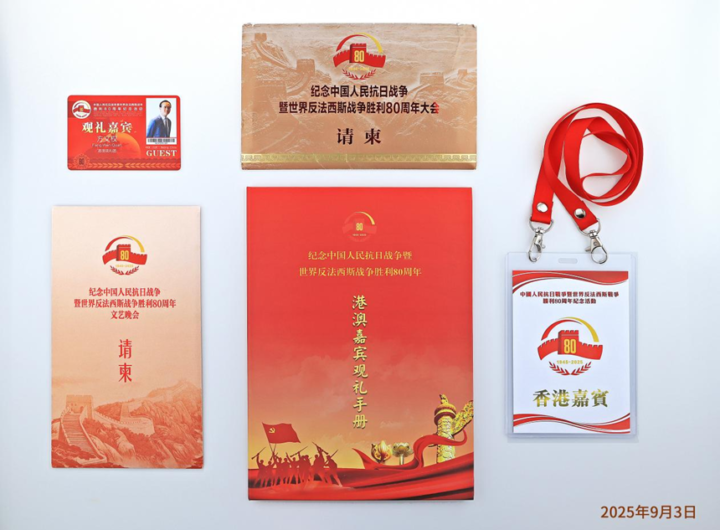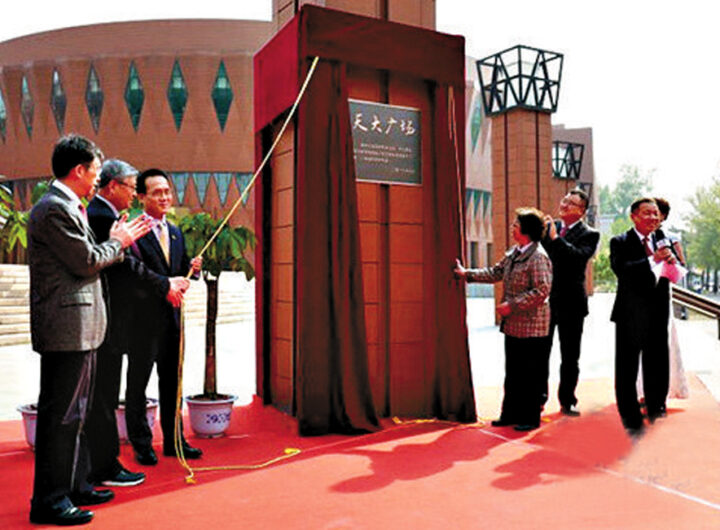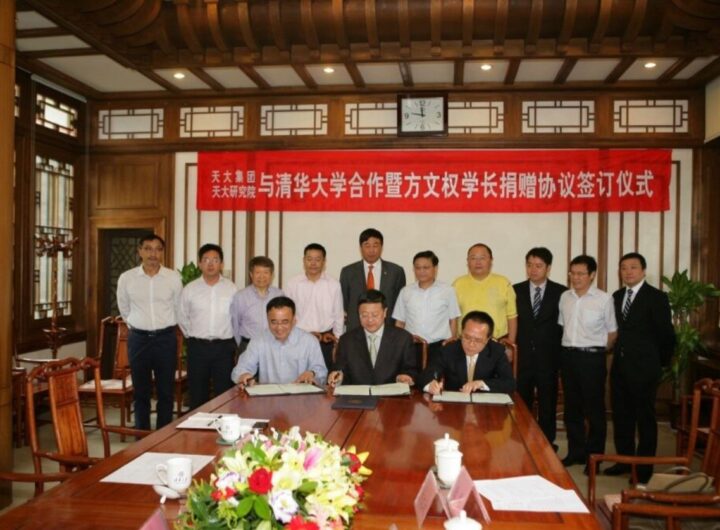(Hong Kong, 9 August 2022) In order to better understand and implement the guiding principles of President Xi Jinping’s address at the Celebration of the 25th anniversary of Hong Kong’s reunification with the motherland, Tianda Institute hosted a seminar entitled “Guangdong-Hong Kong-Macao Greater Bay Area Construction and Hong Kong’s High-Quality Development” with the participation of more than 70 experts coming from think tanks, research institutions, Chinese-funded enterprises, and the political, commercial and academic circles in Hong Kong and the Mainland of China. All participants, online and offline, worked together to explore how Hong Kong could better seize the opportunity of being part of the Guangdong-Hong Kong-Macao Greater Bay Area (GBA) to further unleash its comparative advantages and accelerate its integration into China’s national development through greater cooperation with other cities of GBA, enhancement of its development potentials and pursuit of high-quality growth. The seminar was conducted under the guidance and support of the Research Department and the Economic Department of the Liaison Office of the Central People’s Government (Liaison Office) in the Hong Kong Special Administrative Region (HKSAR).
Mr. John Lee Ka-chiu, Chief Executive of the HKSAR, and Mr. Wang Songmiao, Secretary General of the Liaison Office in the HKSAR, addressed at the opening of the seminar as Guests of Honour. Mr. Tam Yiu-chung, member of the Standing Committee of the National People’s Congress of the People’s Republic of China, and Mr. Yang Jian, member of the National Committee of the Chinese People’s Political Consultative Conference and former Deputy Director of the Liaison Office in the HKSAR, attended the event online.
In his keynote speech, Chief Executive John Lee Ka-chiu emphasized that Hong Kong was an integral part of GBA; its development is, therefore, an inseparable part of the development of its mother country. The Chief Executive referred to the important speech delivered by President Xi Jinping at the ceremony on the first of July this year, at which President Xi pointed out that the principle of “One Country, Two Systems” safeguards China’s national sovereignty, security, and development interests and ensures the HKSAR’s social stability and lasting prosperity, and must be upheld as a long-term policy. Therefore, the HKSAR must firmly support the Central Government in safeguarding national sovereignty; only when “One Country” is secured, can the advantages of the “Two Systems” be unleashed. The development of GBA is a national strategy initiated, planned, and advocated personally by President Xi. It is a new strategy to strengthen the implementation of the “One Country, Two Systems” principle. It is hoped that by deepening the cooperation among Guangdong, Hong Kong and Macao, their strengths could better complement each other, helping to develop GBA into a world-class bay area. Under the “One Country, Two Systems” principle, Hong Kong plays a crucial role as a bridge and a window connecting Mainland China with the rest of the world. Ever since the promulgation of the “Outline Development Plan for the Guangdong-Hong Kong-Macao Greater Bay Area”, all sectors of Hong Kong have actively participated in the development of GBA with substantial progress. The Chief Executive anticipated that all participants in the seminar, being top practitioners in all fields, including experts and scholars from think tanks, would put forward constructive and forward-looking opinions and ideas as a joint effort to make greater contributions to the development of GBA and China’s holistic growth.
Mr. Wang Songmiao, Secretary General of the Liaison Office, pointed out in his speech that GBA was built under one country, two systems, with three customs territories and three legal systems, but with no precedent in any part of the world. Over the past five years, Hong Kong has participated in constructing GBA and leveraged greater integration into China’s national development plan to achieve better results. The Northern Metropolis initiated by the HKSAR Government will be a critical link for Hong Kong to further participate in the high-quality development of GBA, which will effectively spearhead Hong Kong’s development as an international innovation and technology center. Mr. Wang appealed to all think tanks, including Tianda Institute, to work together to unleash their strengths, and focus on issues such as the connectivity of rules and mechanisms among Guangdong, Hong Kong and Macao, improving market integration, and creating a world-class environment for the practicing rule of law, marketization and internationalism. This calls for in-depth research to formulate high-quality research results and policy recommendations, consequently providing reference points for high-level decision-making and local implementation. Think tanks provide a valuable platform for the story-telling of GBA, so that the “Pearl of the Orient” can become a dreamland for global talents and a wonderland for Hong Kong residents to pursue quality life.
Mr. Fang Wenquan, Chairman of Tianda Institute, said in his speech that GBA has evolved from a geographical concept to a national strategy, which is an example of President Xi Jinping’s broad horizon and far-sighted planning. Hong Kong should seize the strategic opportunity of being part of the GBA, and unleash its unique advantages in order to attain higher-quality development. To achieve this aim, “talents” and “popularity” are two key elements. We must strive to make Hong Kong a blessed reservoir that attracts high-quality talents and gathers popularity from all over the world. We must also strive to build a solid foundation for further developing industries that provide continued prosperity and stability. Finance is our core industry with a competitive edge over other economic pillars, which should be supported by the dare to innovate, persistence in self-enhancement and sustainable competitiveness. There must be better connectivity backed by our national development strategies for fulfilling our national missions. Furthermore, innovation and technology (I&T) is a strong driving force, thus policies that are compatible with Hong Kong’s circumstances must be formulated to promote the development of I&T in Hong Kong. When linked together, the Cyberport, Hong Kong Science and Technology Park and the Northern Metropolis of Hong Kong form a shape of a mushroom. By leveraging the scientific research strengths of local universities, joining hands with the scientific and technological elites both at home and abroad, and following the “Mushroom Theory”, a unique “Hong Kong Innovation and Technology Mushroom Cloud” will be created. Mr. Fang also pointed out that the overall living environment of Hong Kong is superb, and the quality of Hong Kong residents is generally high. With the combination of Chinese and Western cultures, both Chinese and Western medicine and health care are fully qualified to lead in building an internationally recognized quality living center, thus making Hong Kong (Xiang Gang) more fragrant (Xiang).
The seminar focused on four key areas, “Financial and Professional Services”, “Shipping, International Aviation and Logistics”, “Innovative Technology and Cultural Development” and “The Role of Chinese Enterprises in the Construction of the Guangdong-Hong Kong-Macao Greater Bay Area”. Participants from all fields, including those from think tanks, research institutions and Chinese-funded enterprises, jointly contributed to the discussion of the development of GBA from different perspectives. Views expressed at the seminar included: a platform to facilitate connectivity of systems and mechanisms; the enhancement of leadership and coordination of participation in the development of GBA; unleashing Hong Kong’s strengths, maintaining Hong Kong’s status as an international economy; updating its industrial structure and infrastructure, such as shipping terminals and big data infrastructure; consolidating risk management and financial innovation; attracting talents and international enterprises to Hong Kong for development, and promoting mutual recognition of professional qualifications, etc. The participants expressed that the blueprint for the construction of the GBA has been drawn up, and now the key is to aim at identifying the pain points, difficulties and bottlenecks during the implementation. This requires transforming ideas and wisdom into a united mission among all sectors of the Hong Kong community; transforming the blueprint into policies and conscious actions of market players; and transforming theories into productivity that promotes high-quality development of Hong Kong. The seminar was a complete success with the support of all participating parties and guests.
Tianda Institute was established in 2005 as a non-profit think tank for strategic studies. For more than ten years, it has put forward new ideas and proposed new measures through extensive researches and intensive debates on critical issues concerning the development of China and the world based on the principle of objectivity and practicality. This seminar aimed to help promote the construction of the Guangdong-Hong Kong-Macao Greater Bay Area and how Hong Kong could grasp this opportunity to further unleash its comparative advantages in order to enhance its dynamic and achieve high-quality development.

Photo 1: Tianda Institute held a seminar on “Guangdong-Hong Kong-Macao Greater Bay Area Construction and Hong Kong’s High-Quality Development”, with the participation of experts and scholars from think tanks and research institutions, and the political, commercial and academic circles in Hong Kong and the Mainland of China.

Photo 2: Mr. John Lee Ka-chiu, Chief Executive of the HKSAR, officiated and addressed the seminar.

Photo 3: Mr. Wang Songmiao, Secretary General of the Liaison Office of the Central People’s Government in the HKSAR, officiated and addressed the seminar.

Photo 4: Mr. Fang Wenquan, Chairman of Tianda Institute, delivered a welcoming speech.

Photo 5: Mr. Fang Wenquan, Chairman of Tianda Institute, suggested building a “Hong Kong Innovation and Technology (I&T) Mushroom Cloud” to make I&T a strong driving force for Hong Kong’s high-quality development.






